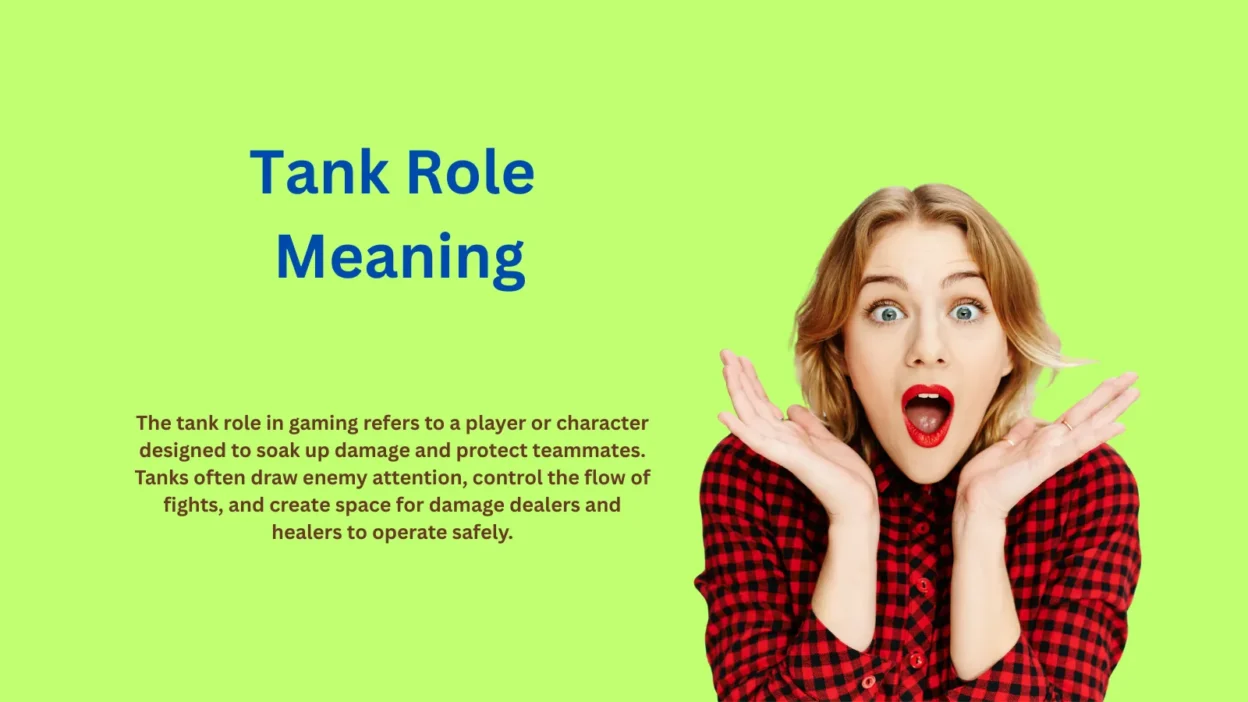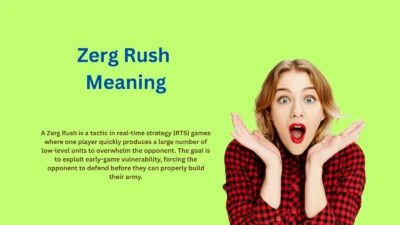From multiplayer battles to competitive esports, the Tank Role Meaning is central to team strategy and gameplay. In gaming, Tank refers to a character or player whose primary job is to absorb damage, protect teammates, and control the battlefield. Tanks are often heavily armored or have high health, allowing them to act as the team’s frontline and shield weaker allies.
Players often use the term in conversations like:
- “I’ll play tank so you can focus on damage.”
- “Our tank really carried the team this match.”
In this article, we’ll explain what the tank role means, explore its origins, show how it’s used in different games, and provide examples that highlight its importance in modern gaming culture.
What Does “Tank Role” Mean?
The tank role in gaming refers to a player or character designed to soak up damage and protect teammates. Tanks often draw enemy attention, control the flow of fights, and create space for damage dealers and healers to operate safely.
Example Sentences:
- “Our tank held the point while the DPS took out the enemies.”
- “Tanks require good positioning and awareness to succeed in team fights.”
Key Points to Remember:
- Tanks absorb damage and protect teammates.
- Often have high health, defense, or shields.
- Play a strategic role in controlling fights and objectives.
- Essential in multiplayer, MOBA, MMORPG, and FPS games.
Background & History
The concept of a tank role originates from early role-playing games (RPGs) and tabletop games, where certain characters were built to take hits for the party. The term itself became popular in online gaming communities in the late 1990s with MMORPGs like World of Warcraft and EverQuest.
Tanks evolved as games grew more complex:
- RPGs and MMORPGs: Tanks lead the party, drawing enemy attacks to protect healers and damage dealers.
- MOBA games (e.g., League of Legends, Dota 2): Tanks initiate fights and absorb damage while supporting allies.
- FPS games (e.g., Overwatch, Apex Legends): Tank characters provide shields, cover, or area control.
Today, the tank role is critical in competitive gaming, esports, and casual team play alike.
Usage in Various Gaming Contexts
The tank role appears across multiple genres and is described differently depending on the game type.
In MOBAs (Multiplayer Online Battle Arenas)
Tanks initiate fights and control crowd:
- “Our tank engaged first, giving the DPS a chance to deal damage.”
- “Good tanking can turn the tide in team fights.”
In MMORPGs (Massively Multiplayer Online RPGs)
Tanks protect healers and manage aggro:
- “The tank pulled the boss while the team prepared buffs.”
- “Without a reliable tank, raids are nearly impossible.”
In FPS (First-Person Shooters)
Tanks act as shields or barriers:
- “Our tank blocked the choke point while the snipers eliminated targets.”
- “Tanks in Overwatch define team strategy with area control.”
In Casual and Online Communities
Gamers often joke or strategize around tanks:
- “Who wants to be the tank this round?”
- “Our tank got all the hate from enemies 😂.”
Common Misconceptions & Clarifications
- “Tanks are easy to play.”
False — tanks need awareness, positioning, and timing to protect allies effectively. - “Tanks don’t deal damage.”
While their main job is absorbing hits, many tanks can deal moderate damage and crowd control enemies. - “Only one tank per team.”
Not always — some games allow multiple tanks or hybrid roles.
Example Dialogue:
- Alex: “I don’t want to be tank; it’s boring.”
- Jamie: “Being a tank is strategic — you’re the backbone of the team!”
Similar Roles & Alternatives
| Term | Meaning | Use Example |
|---|---|---|
| Bruiser | Hybrid tank/damage role | “Our bruiser can take hits and fight back.” |
| Support Tank | Protects team using shields or heals | “Support tank kept everyone alive during the push.” |
| Damage Dealer | Focuses on output, not absorbing damage | “The DPS is free to attack because the tank absorbs hits.” |
| Crowd Controller | Controls enemies’ movement or abilities | “CC tank stunned multiple enemies for our team.” |
While related roles exist, tank focuses on damage absorption and team protection, not just offense or control.
How to Respond to This Term
When someone talks about tanking in a game, your response can vary:
Casual:
- “You got this, tank god!”
- “Thanks for soaking all the damage!”
Funny:
- “Our tank ate everything again 😂”
- “Tank or snack? You’re doing both!”
Professional/Competitive:
- “Good positioning and aggro management.”
- “Nice ultimate timing as tank — perfect initiation.”
Encouraging tank players shows respect for their critical team role.
Regional or Cultural Differences
The tank role is universally recognized in gaming, but playstyles vary:
- US & EU: Emphasis on coordinated team play and aggressive tanks.
- Asia (e.g., Korea, Japan): Highly strategic tank rotations and crowd control.
- Casual vs. competitive communities: Casual players may tank reactively, while pros focus on precise positioning and timing.
Comparison with Similar Roles
| Expression | Focus | Tank Difference |
|---|---|---|
| DPS (Damage) | High damage output | Tank protects while DPS deals damage. |
| Support | Buffing/healing allies | Tank absorbs damage, not just support. |
| Bruiser | Mix of tank & damage | Tank specializes in absorption first. |
| Controller | Manipulates enemies | Tank may control space, but primary is protection. |
Usage in Online Communities & Esports
Streaming platforms (Twitch, YouTube, TikTok):
Tank gameplay is often showcased with tutorials and team strategies.
Competitive esports: Tanks are central to team composition, often making or breaking match outcomes.
Gaming memes & discussions: Players joke about tanks “taking all the hate” or “saving the day.”
Hidden or Offensive Meanings
The term tank role is generally safe.
- Rarely, calling someone a “tank” sarcastically could mean they’re slow or stubborn in gameplay.
- Tone and context clarify intent.
Suitability for Professional Communication
In esports or gaming content creation, tank terminology is widely accepted.
For formal writing about games or strategy, consider alternatives:
- “Frontline protector”
- “Damage absorber”
- “Team initiator”
Example:
Instead of “He’s our tank,” say “He serves as the team’s frontline protector.”
FAQs
- What does the tank role mean?
A character or player who absorbs damage and protects teammates. - Is tank slang or formal gaming terminology?
Gaming-specific term, widely recognized in professional and casual contexts. - Why is the tank role important?
It shields allies, controls fights, and maintains team survival. - Can a tank deal damage?
Yes — most tanks have abilities to deal damage or control enemies. - Is there only one tank per team?
Not always — depends on game mechanics and strategy. - Can anyone play tank?
Yes, but success requires strategy, positioning, and awareness.
Conclusion
The tank role meaning goes far beyond just taking hits — it represents strategy, responsibility, and teamwork in gaming. Tanks are the backbone of successful teams, protecting allies, controlling fights, and shaping match outcomes.
Whether you’re in a MOBA, FPS, or MMORPG, understanding and playing the tank role boosts team success and highlights your tactical skills. Remember: being a tank isn’t about glory — it’s about keeping your team alive and turning the tide of battle.





